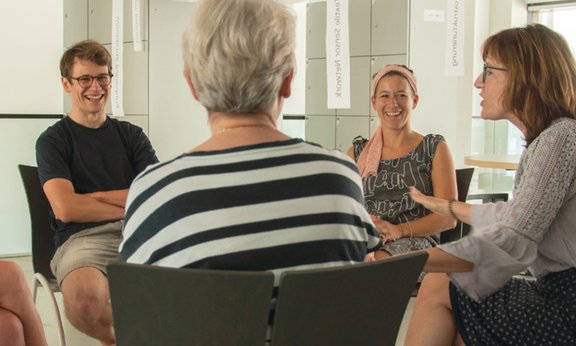Master’s Programme Psychology
Would you like to work intensively on basic psychological research as well as clinical and applied psychology?
The students of the Master’s Degree Programme in Psychology gain sound scientific knowledge as well as qualifications for further training in other psychology related fields. Graduates of the Programme have the qualification to train as psychologists as laid out in the Psychologist Act.
In this Programme students acquire more thorough theoretical knowledge and practical skills of psychological basic research, clinical psychology and applied psychology. This degree is a requirement for further postgraduate education, e.g. PhD Programme, clinical psychology, health, workplace and organisational psychology.
Please note: the language of instruction for this programme is German.
Study Code
UC 033 840
Admission Procedure
Information
FAQ
Graduates possess highly specialized knowledge in the areas of psychological basic research, clinical psychology and applied psychology. They are able to apply their competences in the areas of psychology and at the intersections to other disciplines. Through scientifically correct argumentation and reflection, they are able to achieve interdisciplinary and innovative solutions to problems.
The Master's Programme Psychology is grouped among the natural sciences. It provides in-depth scientific vocational training and qualifies graduates to work as psychologists according to laws regulating the profession (BGBL No. 360/1990, current version). Building on the bachelor's programme, the focus of the theoretical training is on in-depth treatment of the fundamentals of emotional psychology and the psychology of action.
Students acquire in-depth knowledge and practical skills in psychological basic research, clinical psychology and applied psychology, including theoretical and methodological principles as well as methodological competences. One of these areas may be chosen for specialization within the elective modules. Graduates are able to independently understand, critically assess, analyse and find solutions for complex research and applications problems in psychology.
In addition to subject-specific skills, the master's programme conveys key competences for occupational activities:
- Scientific training leads to improved analytical capabilities, such as the ability to analyse and structure complex problems.
- The programme promotes improved communicative competences, cooperative abilities and organizational and teamwork skills.
- The acquired methodological competences are key qualifications that are valuable in all areas of human science requiring the generation of scientific knowledge.
The master's programme provides the prerequisites for further studies in a post-graduate programme (e.g. doctoral programme, psychotherapeutic training, training as a clinical psychologist, health psychologist or organizational psychologist).
Graduates are able to conduct psychological diagnostics independently, to provide responsible, scientifically sound counselling and intervention, e.g. in clinical, educational, healthcare, workplace and organizational contexts as well as in societal or personal situations characterized by crisis, conflict or decision making.
The acquired competences also enable graduates to pursue professional activities in areas involving the human sciences and psychology, for example in the healthcare industry, personnel management, occupational science, technology development, administration, market and media research, and crisis and security management.
Interview with a graduate: Walburga Köchl
"My current and former work would not have been possible without it [degree programme]. I learned a lot about my field and feel that it enriched me personally."To the interview
Graduates tracking: Shows which occupational fields students enter after graduation
Faculty of Psychology and Sport Science Examination Office Information for students with disabilities
Curriculum
From the field

Wie ansteckend sind aggressive Computerspiele?
Jede zweite Person in Österreich tut es: spielen am Computer. Der Trend ist steigend und speziell über die Effekte von Ego-Shootern wird heiß diskutiert. Der Sozialpsychologe Tobias Greitemeyer hat soziale Ansteckung anhand folgender zwei Fragen erforscht: Fördern gewalthaltige Spiele die Aggression der Spielenden und werden deren Freund:innen auch aggressiver, selbst wenn sie nicht spielen?

Ein gutes Gespräch
Ein Lächeln, eine gerunzelte Stirn oder ein skeptischer Blick – die Mimik des Gegenübers verrät viel über den Verlauf eines Gesprächs und beeinflusst die zwischenmenschliche Atmosphäre. Im kommenden Wintersemester startet erstmals der berufsbegleitende Universitätslehrgang „Kommunikation und psychologische Gesprächsführung“.

Geprüfte Liebe
Liebe neu zu erfahren, Beziehungen neu zu organisieren sowie das intensive Zusammenleben oder Getrenntsein neu zu erleben – vor diesen Herausforderungen standen Paare während der Corona-Pandemie, die das Leben der Menschen grundlegend verändert hat. Marcel Zentner, Professor am Institut für Psychologie, hat gemeinsam mit seinem Team Beziehungen in Zeiten von COVID-19 analysiert.

Schleichende Spuren
Wir stellen unser Leben um, verbringen ungewohnt viel Zeit daheim, sind alleine oder lernen den Umgang mit neuen Technologien. Die Corona-Pandemie stellt den Menschen viele Aufgaben, die von allen unterschiedlich wahrgenommen werden und ihre Spuren hinterlassen. Eine interdisziplinäre Forschungsgruppe hat viele Facetten der psychosozialen Auswirkungen von COVID-19 untersucht.
Related studies

Atmospheric Sciences (Master)
Master of Science

Chemical Engineering (Master)
Diplom-Ingenieur*in


















